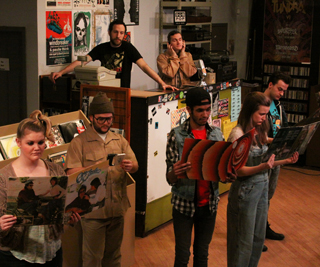
The storefront at 1415 North Ashland Avenue is crammed with bins of vinyl disks, cassette tapes and CDs. The walls and counter are decorated with vintage posters for music clubs like the Empty Bottle, Beat Kitchen and Double Door. Only the sixty-five chairs set up along two sides of the room offer a clue that this is not, in fact, a Used Record Store, but the scenic design for High Fidelity, a musical set in a Used Record Store.
British director Peter Brook once declared the necessities for theater to be a performer, an audience and an empty space. Here in Chicago, we brag that any empty space bigger than a bathroom stall will soon be a theater (spaces smaller than a bathroom stall typically host poetry readings), but Refuge Theater Project is the only company performing exclusively in "found" environments—not out of expediency, but as a deliberate artistic choice.
According to Production Designer Michelle Manni, immersing playgoers into the acting space is an integral part of Refuge's mission statement: assembling a facsimile bar and seating spectators at cabaret tables for Next Thing You Know, for example, or constructing an Astroturf football field scented with aromatherapy oils to smell like fresh-cut grass for Glory Days. Sometimes a location comes ready-made, as when the troubled teenagers of Bare: A Pop Opera confessed their conflicted impulses in the sanctuary of Andersonville's Epworth United Methodist Church. The milieu occupied by Amanda Green, Tom Kitt, and David Lindsay-Abaire's musical adaptation of Nick Hornsby's cult novel is a more difficult proposition, though.
"We wanted the audience to see a record store, from the minute they walked in. A non-theater venue was more logistically and financially effective toward accomplishing that goal. Luckily, our past experience in the event industry—weddings, festivals, industrial fairs—gives us the resources to build out from the bare walls."
This doesn't mean that all bare walls are suitable for theatrical presentation, however: exposed-brick warehouse spaces can make for acoustical problems, while ground-floor storefronts often come with ceilings too low to hang lights. At one far-north side playhouse, patrons are required to take to the sidewalks during intermission to visit restrooms.
"The show determines the choice of venue," Manni admits, "A space appropriate for High Fidelity would never do for a production of, say, Bring It On. We announce our season before we know for sure where we will be performing, so when crunch time arrives, we choose our top three options and pick one."
The surrounding landscape is also an important factor. Long-time off-loop theatergoers recall productions interrupted by ambient noise from post-game foot traffic in Wrigleyville, or police responding to screams and gunshots emanating from slasher-movie reenactments in Edgewater. A production in an apartment near the Lawrence Avenue El station discovered, during previews, that an actor leaning naked out a window could be seen from the platform.
"Going into new rental negotiations with building owners, it's best to be totally transparent. Nothing weeds out the locations where you're likely to have issues faster than announcing at the get-go that there will be a live six-piece band, actors speaking through amplifiers, and crowds departing at 10:30 PM Thursdays through Sundays."
What other advice would Manni offer theater companies scouting for unconventional spaces? "Aim for nonresidential units, preferably near businesses that operate during the day, rather than at night. ADA accessibility and two or more bathrooms are also assets. Check to make sure you have enough electrical power to plug in your lights, sound and band instruments. Oh, and while a shared space usually mandates some nightly 'putting things away,' you don't want to have to completely strike the set after every performance."
So is it all worth it? "There's definitely a savings on rental fees, compared to established theaters, as well as increased convenience regarding available working time. When you can be there 24/7, the tech design team and actors are able to rehearse in the same space where they will be performing. When the audience arrives, we can make them feel at home because it feels like home to us."
High Fidelity runs at "Refuge Records"(1415 North Ashland Avenue) through March 25.
Mary Shen Barnidge
Contributing Writer

 Follow Us On Twitter
Follow Us On Twitter